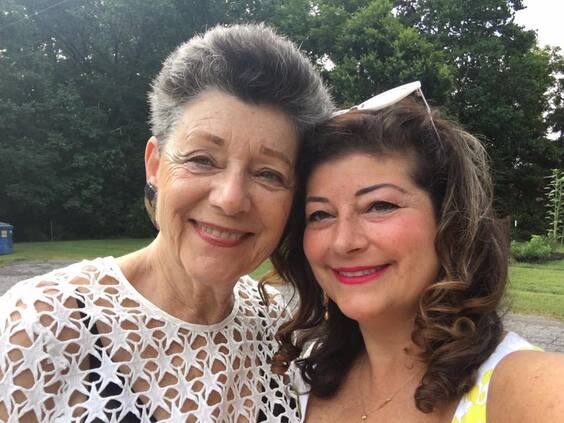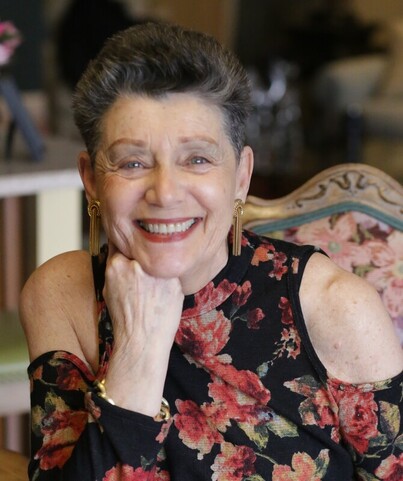Essays, Chapbooks, Contests...Etcetera
RITA PLUSH:
Author & Speaker
Author & Speaker
What I Wanted
|
By Rita Plush
“I can’t breathe,” my daughter said to me. I flew to the nurse’s station. Someone came, adjusted her drip. “Better?” I asked. She nodded, closed her eyes and slept. Or was she resting, that last of her days in the hospital? The hospital she had been in and out of for the past eight years. Trial drugs. Infusions. Chemo. |
A Mother's Love
Rita with her daughter, Leslie |
A port.
More chemo.
Radiation.
Xray.
CT scan.
Chemo.
MRI.
Ultrasound.
Drugs to ease the pain.
To ease anxiety.
To urinate.
To defecate.
Diarrhea; off the med.
Whatever they had, they threw at her.
And through it all, those months and years, that smile of hers, her hope that the next drug or treatment would work the magic; her numbers would go down.
I hadn’t known how sick she was. She told me in small doses, and I knew not to ask for more. To spare and protect me was her intent. But this past Yom Kippur, the Jewish day of repentance, I had a feeling—she’d been hospitalized again. Fluid in her lungs. They suspected pneumonia—a pressing need to see her overtook me. She said she’d be having tests; she might not be in her room and, it was the holiday.
“I’ll take my chances. I’m coming,” I said. “I can fast anywhere.“
Doctors at her bedside. I heard “lungs.” I heard “liver.” Her breast cancer had spread. Was spreading. Did I pray on this holiest of holy days that she would pull out of it as she had all the other times? Bumps in the road, she called them. There was nothing to pull for. The cancer had taken over. She would not be going home. Ever.
“So now you know,” she said after they left.
“Yes.” I could barely get the word out. “Now I know.”
I stayed the day. The monitor beeped. Nurses came and went, adjusting the fluids and medications in the drip bags hooked to the IV poles, trickling into her bloodstream.
The next morning, I took her hand, “I’m sorry if I ever did or said anything to hurt you,” (there was plenty). Both creatives, both opinionated, we shot from the lip. She looked up to me, sought my approval. I didn’t always give it freely.
She turned to me. Now I could barely breathe. Here it comes.
“It wasn’t always this good with us,” she said. “But we made it better.”
“We both wanted it to be better,” I said.
I’d sought her out and drew her out with phone calls. She’d moved into a house with her new husband and was putting her stamp on every wall and floorboard. “What are working on?” I asked her. “Sounds beautiful. Can’t wait to see it.” Another time: “Let’s meet for lunch.”
“How about a play?” she said soon after.
But we are not at a play. We are in her hospital room having what would be our last conversation. “People can change,” she said. “And now we have our love, and that will help you through this.” Help me through this? My daughter was dying and she thought of me getting through this? Wrong! Wrong! Wrong!
I wanted more than our love! I wanted her. Her in her house, her beautiful creative hands that had turned the little obscure cottage into a showplace for her talents.
I couldn’t wait till the shiva was over. On Saturday I drove there.
Layer by layer, I wanted to peel the paint off the shingles and take it home with me.
I wanted to pry up the floorboards she’d stenciled. Pull down the walls she’d glazed. Chisel off the ceramic tiles she’d designed, formed and fired for the backsplash in her kitchen.
I wanted the food she’d cooked that was still in the fridge. To gorge myself on it. Everything she touched and made, I wanted.
I wanted the clothes she wore—they wouldn’t fit. But I could smell them; they still had her scent.
I wanted her jewelry. Her earrings. Her bracelets. Her pins. I wanted them all. As if by possessing her things I could possess her. Loop her through my ears. Fasten her around my wrist. Pin her to my bosom. My darling girl.
I wanted to gather up all the maimed and injured parts of her and put them back into me, so I could give her life again. Birth her again. Whole. Undamaged by disease.
That’s what I wanted.
The End
More chemo.
Radiation.
Xray.
CT scan.
Chemo.
MRI.
Ultrasound.
Drugs to ease the pain.
To ease anxiety.
To urinate.
To defecate.
Diarrhea; off the med.
Whatever they had, they threw at her.
And through it all, those months and years, that smile of hers, her hope that the next drug or treatment would work the magic; her numbers would go down.
I hadn’t known how sick she was. She told me in small doses, and I knew not to ask for more. To spare and protect me was her intent. But this past Yom Kippur, the Jewish day of repentance, I had a feeling—she’d been hospitalized again. Fluid in her lungs. They suspected pneumonia—a pressing need to see her overtook me. She said she’d be having tests; she might not be in her room and, it was the holiday.
“I’ll take my chances. I’m coming,” I said. “I can fast anywhere.“
Doctors at her bedside. I heard “lungs.” I heard “liver.” Her breast cancer had spread. Was spreading. Did I pray on this holiest of holy days that she would pull out of it as she had all the other times? Bumps in the road, she called them. There was nothing to pull for. The cancer had taken over. She would not be going home. Ever.
“So now you know,” she said after they left.
“Yes.” I could barely get the word out. “Now I know.”
I stayed the day. The monitor beeped. Nurses came and went, adjusting the fluids and medications in the drip bags hooked to the IV poles, trickling into her bloodstream.
The next morning, I took her hand, “I’m sorry if I ever did or said anything to hurt you,” (there was plenty). Both creatives, both opinionated, we shot from the lip. She looked up to me, sought my approval. I didn’t always give it freely.
She turned to me. Now I could barely breathe. Here it comes.
“It wasn’t always this good with us,” she said. “But we made it better.”
“We both wanted it to be better,” I said.
I’d sought her out and drew her out with phone calls. She’d moved into a house with her new husband and was putting her stamp on every wall and floorboard. “What are working on?” I asked her. “Sounds beautiful. Can’t wait to see it.” Another time: “Let’s meet for lunch.”
“How about a play?” she said soon after.
But we are not at a play. We are in her hospital room having what would be our last conversation. “People can change,” she said. “And now we have our love, and that will help you through this.” Help me through this? My daughter was dying and she thought of me getting through this? Wrong! Wrong! Wrong!
I wanted more than our love! I wanted her. Her in her house, her beautiful creative hands that had turned the little obscure cottage into a showplace for her talents.
I couldn’t wait till the shiva was over. On Saturday I drove there.
Layer by layer, I wanted to peel the paint off the shingles and take it home with me.
I wanted to pry up the floorboards she’d stenciled. Pull down the walls she’d glazed. Chisel off the ceramic tiles she’d designed, formed and fired for the backsplash in her kitchen.
I wanted the food she’d cooked that was still in the fridge. To gorge myself on it. Everything she touched and made, I wanted.
I wanted the clothes she wore—they wouldn’t fit. But I could smell them; they still had her scent.
I wanted her jewelry. Her earrings. Her bracelets. Her pins. I wanted them all. As if by possessing her things I could possess her. Loop her through my ears. Fasten her around my wrist. Pin her to my bosom. My darling girl.
I wanted to gather up all the maimed and injured parts of her and put them back into me, so I could give her life again. Birth her again. Whole. Undamaged by disease.
That’s what I wanted.
The End
|
Rita Plush lives and writes in Queens, New York. Her writing practice includes both fiction and non-fiction.
She is the author of the novels Lily Steps Out and Feminine Products, and she wrote a short story collection titled Alterations. Rita is the book reviewer for Fire Island News. Her stories and essays have been published in The Alaska Quarterly Review, MacGuffin, The Iconoclast, Art Times, The Sun, The Jewish Writing Project, The Jewish Literary Journal, Chicken Soup for the Soul, and many others. As a sought-after speaker, Rita has presented at libraries and synagogues, and at Hofstra University and CW Post Hutton House on varied topics including: decorative arts, interior design, “Writing and Publishing in the Modern Age,” “So You've Written a Book; Now What?” and “Coco Chanel ~ The Woman-The Legend.” Since the start of the pandemic, Rita has been giving Zoom classes and talks on writing and the decorative arts. Follow Rita on:
|




